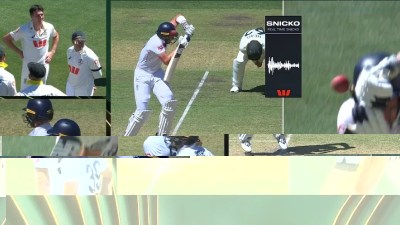It also flagged concerns that an Opposition party may not know who the donors are, but “donors to the Opposition party can be ascertained, at least by the investigative agencies”.

Chief Justice of India D Y Chandrachud, presiding over a 5-judge Constitution Bench hearing petitions challenging the validity of the scheme, said, “The problem with the scheme is that it provides for selective anonymity/confidentiality. It’s not completely anonymous. It’s not confidential qua the SBI (the bonds can be purchased only from SBI). It’s not confidential qua the law enforcement agency. So, a large donor would never take the risk of buying the electoral bonds for the purpose of tendering it to a political party.”
“All that the large donor has to do is to disaggregate the donation, get people who will purchase electoral bonds with small amounts which will be then purchased by official banking channels, not through cash,” he said.
The CJI was responding to submissions by Solicitor General Tushar Mehta who appeared for the Centre and said the scheme was part of several steps taken to weed out black money from politics, something every nation was grappling with.
Mehta told the bench, also comprising Justices Sanjeev Khanna, B R Gavai, J B Pardiwala and Manoj Misra, “This was the first step. The second step was registration of shell companies. Between 2018-2021, the Government of India identified 238,223 shell companies and actions were taken. This is one of the vehicles through which unclean money passes.”
The scheme, Mehta said, does not offer anonymity or opacity but “it is a restricted, limited confidentiality which can be opened and the veil can be lifted by judicial direction”.
Story continues below this ad
Justice Gavai asked the Solicitor General about concerns that it may be possible that 100 people buy bonds of Rs 1 crore each and somebody may purchase those Rs 100 crore from them by paying cash.
Mehta said it will be simpler for a person to go to a political party and say take Rs 100 crore in cash, and not create more accomplices.
Justice Gavai said, “The advantage is that the political party will get the amount in white.”
Interjecting, the CJI said, “What will really happen is this: A large donor will never put his or her head on the line by being in the books of account of the SBI having purchased.”
Story continues below this ad
But Mehta said donors were purchasing bonds directly. “They are doing it,” he said, adding that a possible or potential abuse may not perhaps be the ground to hold the scheme unconstitutional. Stating that the older scheme was even less transparent, he said a return to it would only make things worse.
To build his argument, he referred to statistics of income of parties from unknown sources under the old scheme. “The income of national parties from unknown sources increased by 313% from Rs 274.13 crore during FY 2004-2005 to Rs 1130 crore during FY 2014-15,” he said.
Countering the argument that the major share of the bonds has gone to the ruling party, the SG said “more contribution going to the ruling party is the norm”. He said it has always been so “whether it’s this scheme or the one prior to this”.
To a query from the CJI why the major share always went to the ruling party, Mehta said, “I wouldn’t be able to hazard a guess, but figures say that whoever was ruling party possibly received more.”
Story continues below this ad
“This is my reply, not the government’s reply. This is my assistance. Generally, every political party has their programme and policies etc. They have their working styles. All people — individuals, corporations — know the working styles. They know that if this party forms a government, it would be more beneficial for us… What is running in the mind of the donor is not possible to decipher. But by and large, they decide as per their interest. They are not doing charity. They are doing their own business. It’s market-driven. More powerful the leader, the more capable the party, the more chances of success — the donor feels that he would be more comfortable doing his business.” he said.
The CJI said, “What we are now doing is that in an effort to bring in white money in the process, essentially, we are providing for a complete information hole. That is the problem. The motive may be laudable completely. The question is whether you adopted means which are proportionate or which meets the test of Article 14?”
Mehta reiterated that anything other than keeping it confidential will not be able to address the problem of victimisation. “And victimisation incentivises payment by cash,” he said.
Justice Khanna said, “Victimisation and retribution is normally by the party in power, not by the party in Opposition. So the figures which you are saying —that the maximum donations are to the party in power and not to the party in Opposition may not, therefore, be logically flowing from that argument.”
Story continues below this ad
“The other issue,” Justice Khanna said, “is… there are ways to get the information on donations to the Opposition party. And it is easier for the party in power to get that information. The fear is because of this selective confidentiality, the Opposition party may not know who are your donors. But donors to the Opposition party can be ascertained, at least by the investigative agencies. So, they are put at a disadvantage to question you on your donations whereas their donations can be questioned.”
Mehta said it was not possible under the scheme for anyone, including the Central government, to know who has contributed to whom. “Nobody can get to know, including the Central government,” he said.
He said while every system is prone to misuse, the 2018 scheme offers better protection to “genuine people who want to contribute without any retribution”.
The CJI said, “But retribution is not avoided by the scheme… Under the Companies Act, as now modified, a company is not required to disclose to which political party it has contributed. But it has to disclose how much it has contributed totally. So a company says I have contributed 400 crore this financial year. Now a party, including a party in power, knows how much has come to it in terms of electoral bonds from that company… You also know from the company’s balance sheet how much it has contributed in a macro sense… That mismatch is sufficient to know as to how much money has gone to the party in power. So it’s not that the possibility of retribution is avoided from this scheme.”
Story continues below this ad
On the SG’s argument that under the old scheme, there was greater scope for misuse since cash payments from unknown sources dominated the contributions, the CJI said, “The malaise is agnostic to political parties whichever side of the political spectrum you are. So we are not here saying that a political party is holier than the other. We have no problem. This figure you have said — we will not say more than that – is 2004-05 to 2014-15. Your chart is not lost to us.”
“It still really begs the question in the sense that for us it’s not whether the ruling political party in power presently is going to be beneficiary of that or not. We are testing a question of constitutionality. We take your point that it is part of our political system. Whoever is in power gets the large share of the pie so far as electoral contributions are concerned. We have to deal with this. uninfluenced by all this,” he said.
“The donor doesn’t necessarily buy this bond. The person who buys the bond may not be the donor. Second, the person who buys, the balance sheets will reflect the amount of bonds. Balance sheets of the purchaser will reflect, not the donor,” he said.
Referring to the SG’s submissions on the introduction of the Bill in Parliament, the CJI said, “The then Finance Minister, in his speech, says when cash is given, the source of money, the donor, and where it is spent is not known. Therefore, at least now it will be known” and asked “how will this be known?”
Story continues below this ad
“Suppose an electoral bond is purchased, the source of the money is not known. The donor is not known. Where it is spent is not known. All three are not known,” the CJI said.
Mehta said, “The Minister is envisaging that my balance sheet would reflect that I am buying the bond. The scheme says I can buy only when I am KYC compliant and, therefore, it would be known who has bought an electoral bond… Now when it is given to a political party, the party would deposit it in a designated account. That account also will have to reflect in the statement of accounts of that political party which will be filed before ECI (Election Commission of India). ECI would know at least 500 crore have come by way of clean money. In the case of cash, nobody knew. I may go with a bag of 50 crore to a political party and nobody would know, where the money went, what it was used for.”
On Mehta’s argument that the SBI is obliged by law to maintain confidentiality, Justice Khanna asked how can the question of quid pro quo be addressed if so.
The CJI wondered “is it not liable to say (that it will) give rise to kickbacks or legalising kickbacks?”
Story continues below this ad
Mehta said, “If this scheme didn’t come, if I had to pay kickback. I will pay the kickback by way of cash. Even considering the case to be the worst case, the amount will now come in white money in channels.”
The CJI remarked, “It is legalising kickbacks.”
Mehta said if that is so, it will still be an offence and that he will show it when the arguments resume Thursday.









